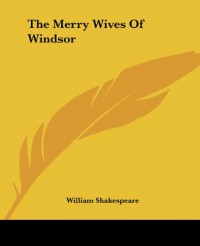Meandering Em's
Passion is books, photography, running and traveling. Also passionate about environmental issues.
Smuggling and Murder
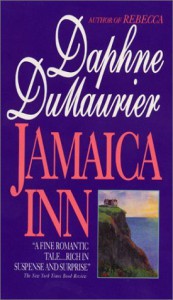
Jamaica Inn stills exists. Daphne du Maurier visited the inn and, while exploring the moors, got lost in the fog. From this event, she wrote Jamaica Inn.
Mary is orphaned. Before her mother dies, she tells her to go live with her aunt. Mary keeps that promise and finds herself in a nightmare situation. Her aunt's husband seems abusive and her aunt cringes at his moods. The inn does not welcome the weary traveler. Usually the huge building is occupied by only Mary and her aunt and uncle. Occasionally, unsavory types gather at night. Mary discovers mysterious happenings: there is smuggling and murders. She makes plans to avenge her uncle's brutishness or escaping with her aunt. In the process, she meets her uncle's brother who bears a strong resemblance to her cruel uncle. Despite this detriment, Mary falls in "love" with him even though she doesn't trust him. One horror after another plagues Mary and she attributes much of this to her erstwhile lover.
The first half of the book slow-going. However, it was hard to stop reading the second half. There were a few incidents that really didn't make sense and created disbelief in the story line. One thing I did enjoy was the descriptions of the moors and mountains, cities and towns, all of which exist today. Now I have to make a trip to Cornwall to see all the places Ms. du Maurier described so eloquently.
I discovered a new mystery writer!

I have never read a mystery by Charles Finch until I won this book in a Goodreads giveaway. I am very happy I was sent the book (in just three days!) and delighted that the book was so enjoyable.
I like historical mysteries, especially those set in Victorian England. This author's lead detective is Charles Lenox, a member of the aristocracy. He has just given up his seat in Parliament to set up a detective agency. Even though Lenox wants to be a detective, he is overwhelmed by running the detective agency as a business. One partner leaves when Lenox doesn't bring in profitable work. Finally, Lenox gets invited by Scotland Yard to work on a case when one of his friends is murdered. Resolving this crime takes Lenox from the boat docks on the Thames to home of a degenerate peer. His wife and daughter are threatened while he is trying to solve the case.
I had to verify that the Underground actually existed in 1876. It did, although it was called the Metropolitan Railroad at first. I didn't realize that it was running that early.
I also wonder if the author would have liked to be a detective during the Victorian Era, so he dubbed the detective, Charles, after himself.
I did not want to put this book down, so I stayed up later than I should have, to read more. This book gets 4 1/2 stars!
Another Christie Mystery

I remember reading this book 16 years ago and enjoying it immensely. I have just repeated that experience. I even remember some crucial clues, so much of the story was not surprising. However, I enjoyed the journey. I love how Mrs. Christie uses only a few words to describe her characters, yet we get a complete picture of their looks, fashion, and character. An example is the following: "She wore country tweeds - and with them, rather incongruously, a choker necklace of large false pearls." That's a pretty complete picture of Miss Blacklock.
Northanger Abbey
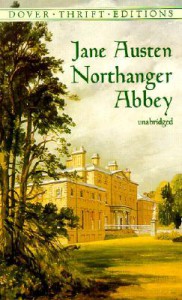
This is a 3 1/2 star reading. Now I love Jane Austen, but this first complete book that Ms. Austen wrote is not her best. I found some passages, especially in the beginning, to be long-winded and many times I put the book down and was reluctant to pick it up. This book would be much better if you read The Mysteries of Udolpho or other Gothic books first, since there are numerous references to these books.
Catharine Morland is a young, naive girl who takes her first trip to Bath. There she becomes friends with a family that is entirely unsuitable. They are money-hungry and hypocritical. Nothing they say can be believed, but Catharine is too innocent to see this. Somehow a rumor starts that Catharine comes from a wealthy family, so she is the recipient of a young man who comes courting. Catharine doesn't like him, but she is too impolite to be rude to him. She is unaware of his motivation and his marital plans. Catharine does meet the Tilneys. Henry catches her eye and they gradually become close. Henry's father shows up in Bath and he hears that Catharine is wealthy. Noting that she likes his son, he invites Catharine to his home at Northanger Abbey.
Catharine, who spends her spare time reading Gothic literature, imagines that the abbey will be like the castles and abbeys described in Gothic literature. Her explorations and discoveries lead to hilarity. She determines that Henry's father murdered his wife. When Henry discovers this, he is horrified and tells Catharine that she is mistaken. It seems that Catharine has misread all clues and misunderstood conversations. Then real life intrudes and she is blindsided by a real life tragedy.
The second half of the book was much better than the first part. So, if you find difficulty reading the book in the beginning, be patient. It does get better.
Heroic or Crazy?

I find that Shakespeare's comedies are much easier to read and understand than the tragedies and histories. This is true in the comedy, Much Ado About Nothing. The interplay between Benedick and Beatrice was fun to read and imagine. However, the story of Claudio and Hero was a complete mess. Claudio is tricked into believing Hero has a boyfriend and is not a virgin. Instead of investigating further, he decides to confront her at the wedding and humiliate her. Later, when he finds out he has been tricked, he is sorry and ends up marrying her anyway. Gross! Why would Hero's father want his daughter married to the man who destroyed her wedding? Why would Hero agree to marry him? This marriage convinced me the the play is actually a tragedy, at least for Hero.
I went to see the play last night at the Shakespeare Theater in Madison, NJ. I was eager to see the interplay between Benedick and Beatrice. Unfortunately, the director decided to make it into "Christmas" play set during World War II. It was distracting to hear Elizabethan language used with 20th century clothes, music and dance. Benedick and Beatrice were played by a couple that appeared to be in their 50's. Anyway, I did not like the performance and am looking forward to seeing this play again with a different theater group.
The play as written by Shakespeare is 3 1/2 stars, while the performance was a 2.
The Little Prince

This is considered a children's book and is read in the 4th and 5th grades. I am not sure if children would understand the meaning. I'm not sure it is even written for children.
A man crashes his plane into the Sahara Desert where he meets a little prince who is from a very small asteroid. The prince leaves home because he doesn't understand a beautiful flower who decided to germinate on his "planet." He visits several other asteroids which also have only one occupant. One is ruled by a king who has no subjects. Another is inhabited by a vain man who did not listen. "Vain men never hear anything but praise." One planet belonged to businessman. Times haven't changed because this man was too busy with his calculations to have a meaningful and useful life. Eventually, the little prince lands on Earth and finds everyone running around trying to find satisfaction.
The little Prince finally realizes he needs to go back home and leaves the narrator full of sadness.
What is the main theme of the book? I suggest you read it and let me know what you think.
Ordeal by Innocence

Enjoyed this mystery by Agatha Christie even though I found the murder rather far-fetched. I couldn't determine how Dr. Calgary figured out the murderer since he didn't even have all the clues the reader had! I did like the idea that murders should be solved in order to help the innocent suspects. It must be devastating to be suspected of a crime by your family and friends with no way to prove your innocence.
A Crooked House
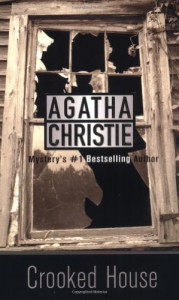
Enjoyed another Christie book that does not star Poirot or Miss Marple. The patriarch of a family is murdered. It appears it is someone in the family, but who? Charles is the fiance of the oldest grandchild. She will not marry him until the killer is revealed, so Charles gets involved. He is not the detective nor does he solve the puzzle, but he does reveal the problems that can occur in a large, loving family that is ruled by a benevolent tyrant.
A Rags to Riches story

This 3 1/2 star children's book is almost unknown today. Horatio Alger, Jr. was a prolific and popular author in the 19th century. He wrote many books in the same formulaic style, which is "poor boy" becomes respectable through hard work. However, this was the first book I read and I quite enjoyed it.
Ragged Dick is an orphan who lives on the streets of New York. He makes money by shining shoes. He sleeps wherever he can. Because he is a hard worker and honest, he begins to attract the attention of several men who buy him better clothes, encourage him to get an education and "better himself." We see the efforts that Ragged Dick makes to rent an apartment, get an education, open a bank account and finally get a good job.
Alger wrote these books to show the condition of the homeless children on the streets of New York. He was trying to get the public to have compassion for these children. He was successful in many ways.
I did not rate the book higher because I thought some of the events were not very probable. The best example was near the end of the book where Dick rescues a boy who fell in the water. It is said that Dick was an excellent swimmer, yet it is not likely that a boy who spent most of his days shining shoes had time to become an excellent swimmer.
Another Good Novel by Trollope
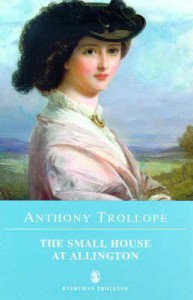
Lily meets a young man from London. They fall in love quickly and become engaged. But Lily's young man, Crosbie, soon begins to have doubts. The doubts are created by the awareness that Lily's uncle does not intend to give any money to her when she marries. This means that Crosbie will have difficulty supporting a wife. He leaves Lily and goes to visit the Earl of De Courcy's family. In the Earl's mansion lives his daughter, Alexandrina, who is desperate to marry. Lured by the money and fame of the family, Crosbie jilts Lily to marry Alexandrina.
Most of the book follows the lives of Lily and Crosbie with an assortment of minor characters, many who are memorable. One person is Johnny Eames, a young man who has known Lily for years and has fallen in love with her. Will he be successful in his suit? Will Lily get over her heartbreak and consider marrying him in the future?
The most interesting character is Crosbie. He is afraid he will lose his status if he marries Lily. He is afraid he will be poor forever. As soon as he becomes engaged to Alexandrina, he regrets it. However, he can not break off an engagement with an earl's daughter. Crosbie finds that he loses status when he marries Alexandrina and all his money is tied up by the family's financier. He loses almost everything he had hope to gain by marrying into the aristocracy. Crosbie will never be happy because he always thinks, "What if I had..."
I was disappointed in Lily's depiction. Trollope leaves us with an indication that she never marries because she was still in love with Crosbie and is determined to consider herself as a widow forever. Since the books ends about 8 months after she was jilted, there certainly wasn't much time for her to recover from a broken heart. I saw her as a young woman determined to be in love and unwilling to admit she made a mistake in trusting Crosbie. She is stubbornly determined to be "faithful" to him even though they had not married. This seems absurd to me and unrealistic.
Something to read for Armistice Day, November 11

Kezia married her best friend's brother just a few months before World War I began. Kezia marries a farmer and is learning the skills needed to be a farmer's wife. She improves her cooking by experimenting with herbs from her garden and and her new husband is enjoying her experiments. Soon after the war begins, her husband volunteers to join the army and fight in France. Kezia is left to farm the land with only two workers, while her husband goes to the battlefront. Kezia's best friend decides to drive an ambulance to pick up the wounded on the front lines. Kezia writes cheerful letters to her husband and includes descriptions of meals she is supposedly making. These letters are very popular with all the soldiers, especially since their food is awful.
War is terrible, especially one that did not need to occur, like World War I. Everyone is affected. The war was fought in trenches with little or no progress for years. There were many horrible injuries, both mental and physical. There were so many deaths on the front lines. However, this novel also shows how women were affected by the war. They stayed home trying to be the farmers, workers and breadwinners. Food was scarce. The government took their horses, but still expected the farms to produce crops for the army. There was constant sorrow in the villages when many of the young men died. It is hard to comprehend why this war was allowed to continue for four long years, killing more than 7 million CIVILIANS. That number does not include the combatants.
Jacqueline Winspear only writes about the first year of the war, but that is all that is needed for the reader to comprehend the senselessness of war. Her novel reveals the devastating events of exactly one century ago. It is an excellent book to read on Armistice Day, November 11.
 4
4
How is this a comedy?

This is a very strange play. Many call it a comedy, but there is very little that is humorous. It has a villain named Shylock, who is always referred to as a Jew, with the word "dirty" implied, but not said. There is a rebellious daughter, a melancholy merchant, and an enterprising heroine named Portia. There is an improbable trial with a fake judge making a judicious decision. I found the play interesting to read, but certainly not a comedy.
Reading Macbeth

I am taking two classes on Macbeth. One class was finished last Tuesday evening. We read this play out loud, taking five weeks to read five acts. Each student spoke different parts in each scene and then we discussed it. This is a wonderful way to read the play. It helps to understand the language and grasp the nuances which are missed in watching a performance or reading it straight as a play. I got to read Lady Macbeth's final speech on the last night! I was thrilled. Thanks to Geoffrey Owens for guiding us on our journey.
A Dream-like Play

I am taking an on-line course on Shakespeare and this is play #2 read and discussed. It is a light, breezy play with capricious fairies, forsaken lovers and bumbling working class actors who perform a play within a play. This was very easy to read and enjoy, but nothing of depth. The most memorable line is "Lord, what fools these mortals be!"
Didn't Understand It

A few years ago I read We Have Always Lived in a Castle which I enjoyed. When nominating a spooky read for one of my book clubs, I selected this book. Unfortunately for me, it won.
The book starts off by saying "No live organism can continue for long to exist sanely under conditions of absolute reality; even larks and katydids are supposed, by some, to dream. Hill House, not sane, stood by itself against its hill, holding darkness within; it had stood so for eighty years and might stand for eighty more." It ends with almost the same quote. I thought the initial quote was fantastic, but repeating it at the end left me confused because in between these statements was a convoluted story.
There were four visitors to the house who were trying to find a psychic presence at the house. The reader gets all their information from Eleanor's viewpoint. She is a completely unreliable narrator. Eleanor would be terrified one moment and happy the next. I never understood why. Eleanor liked the others at the house one moment and hated them the next. There were very few clues as to why Eleanor acted this way or why the house was not sane. I was just glad the book was only 174 pages since it seemed as if it were 600 pages. It took forever to wade through incomprehensible thoughts and actions of Eleanor.
If you enjoy ghost stories or horror novels, you might like this book. Otherwise, avoid it.

 2
2
